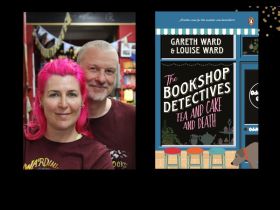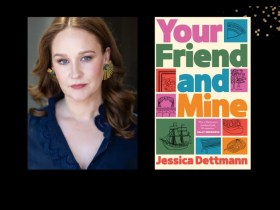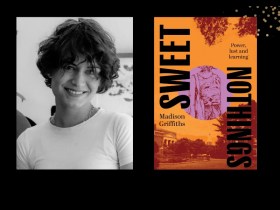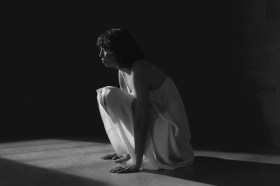Being a writer is one of those professions that don’t really have a clear trajectory, and many delve into the industry without formal education on how to be a writer. For the majority of writers/authors, publishing their first book is where the journey begins – as exciting as it is nerve-wracking.
Bastian Fox Phelan, whose debut memoir How to be Between was just published this month told ArtsHub: ‘When I enrolled in a memoir masterclass to start writing my book I very naively told people “I’m writing a book, it won’t take me that long, maybe a year”. [My] famous last words.’
In fact, the memoir process took eight years, through which Phelan embarked on a research masters, moved to Newcastle, got married and had a baby, who is now three-months old.
They continued: ‘I went on such a journey with this book [that] the process really taught me how to be a writer … I kind of went through this process of maturation from being in my late 20s to now, I’m 35.’
If I hadn’t chosen to really dedicate myself to writing in every way possible, I would have never known if I could have done it.
Bastian Fox Phelan
Dinuka McKenzie, author of The Torrent which took out HarperCollins Australia 2020 Banjo Prize for fiction also shared her experience from being an outsider: ‘Initially I wrote to carve out something for myself between having young kids and managing my work. But then of course I fell in love with writing and really really wanted to pursue it.
‘I was surprised that my first book was published because I was treating everything like an apprenticeship, all the learning and researching … I slowly realised there’s a writing community out there and then it was all about getting feedback, doing workshops and online courses, which were my go to,’ said McKenzie.
Both agreed that consistency was key to reaching the final pillar of publication, but also for maintaining a balance between writing and trying to promote your work.
‘In theory I think there’s a difference between being a writer and writing,’ offered McKenzie, ‘you get pulled in a million different directions so what I’ve told myself is to just turn up everyday, even if I write one paragraph.’
Similarly, Phelan said ‘I had to work lots of different jobs during the whole time of being a writer … If I didn’t have one or two days per week that I could just dedicate to writing then it would have been really easy for it to just end up not happening. You do have to have that consistent approach to writing.’
Congratulations, you’re published! What’s next?
Now that your book is published, where to next? While jumping into the next writing venture poses the most excitement, much of a writer’s time can be taken up to promote your book and attend events that help build up your profile.
Phelan said: ‘I think it’s really important as a debut writer to try to get your book out there as much as possible. So, yeah, I’ve said yes to almost all of the opportunities that I’ve been given with this book.’
Apart from taking on the opportunities, it’s also about knowing when to say no, said Phelan. One of which was where they felt the magazine tried to sensationalise the content of How to Be Between, a memoir interrogating identity and gender binaries through Phelan’s embracement of female facial hair.
2019 Writeability Fellow Jess Obersby, and now Program Manager for the initiative that supports aspiring writers with disability, also touched upon the need to weigh up such opportunities.
‘Some people in the publishing industry can be predatory, and while this is an issue for all emerging writers, it can be worse for disabled writers,’ said Obersby. Part of Writeability’s work is to make sure ‘that disabled writes are supported to set boundaries about what they are, and are not, comfortable talking and writing about.’
She continued: ‘We don’t want them pushed into writing about very personal things for a voyeuristic audience’s pleasure. And certainly no inspiration porn.’
On the other hand, finding your peers and like-minded people is crucial for sustaining a career as a writer, with social media being a handy tool.
Phelan said they’ve been very active on social media after their book launch, and spends most of the time sharing it with their network and ‘getting back in touch with all the people that knew me along the way, and helped to shape my writing in some way or another.’
Obersby added that ‘the importance of community cannot be overstated’, and joining a writing group, participating in festival events as well as using your local library or council as a resource are all great ways to start.
It comes down to making sure that you’re active in the literary community in some way.
‘I’ve been looking out for people in the community who are publishing their books and making sure that I support other writers as well – that’s what comes naturally to me,’ said Phelan. ‘I think supporting the work of other people is a really important part of being a writer. It’s not just “look at me everyone, I did a thing”. We all succeed together, that’s my philosophy.’
This sentiment is shared by McKenzie and many writers across the board, who added ‘what’s great about the community is that it’s [built] on the principle that we all rise together’.
She continued: ‘I think it goes both ways. As long as you’re meaningfully engaged in the community, you’ll get that [support] back.’
Words of advice for emerging writers
McKenzie said: ‘Competitions are your friend – for one, they give you a deadline. [Secondly], your work actually gets read when you enter them into competitions compared to being in the slush pile … Eventually the more you write the more you get better and you’re learning. If you get in the shortlist you’ll also get feedback from actual industry professionals. That’s gold.’
In addition, Twitter was a major platform where McKenzie got to build her literary community and gain feedback, giving a special shoutout to Emma Viskic who shared her time to support emerging writers like McKenzie.
Obersby also mentioned competitions and awards as a great way to get a foot in the door, adding ‘there are some great mentoring and fellowship programs out there too for emerging writers, including The Next Chapter program, Varuna residencies, Wheeler Centre Hot Desk Fellowships and of course the Writeability Fellowships with Writers Victoria.’
Sadly money is still a common barrier to writing, and ‘authors all have other day jobs’ to support their writing endeavours, said Obserby.
This is one of the reasons why Phelan took a slightly different path. After completing their research masters, they are now doing a PhD at the University of Newcastle to develop their next manuscript of a eco-memoir. ‘I do think getting a scholarship to do a PhD is a pretty good option for writers because it means that you can work full time on a book and also have a qualification at the end. You do have to do the theoretical aspects and that’s not for everyone, [but] I don’t think I’ve come across any grants that would be a decent wage for three and a half years, which is what a PhD offers,’ they explained.
To sum up, Obersby concluded: ‘The more people you meet, the more opportunities you’ll find for your writing.‘
Dinuka McKenzie will be hosting an online session to offer 10 tips as a debut author with Writers SA on 7 June.
Bastian Fox Phelan and Jess Obersby will be speaking at the online National Writers’ Conference on 18 June, as part of the 2022 Emerging Writers’ Festival.





